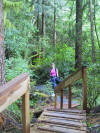|
Up the West Coast of Vancouver Island:
Hecate to Nuchatlitz Inlet, Nootka Sound
 |
Day 11:
Nuchatlitz Inlet, Nootka Sound |
 |
Our next stop was Zeballos, for fuel and a tour through town. Like
Tahsis, its situated at the end of an inlet with steep mountains all
around. Its industry was once mining, but is now logging with a heavy
dose of fishing, both commercial and recreational, as well as ecotourism.
|
 |
After fueling, we watched a fish boat unload its catch. It was quite
an efficient operation, with several people
working ashore to kill the fish and pack them on ice as they came down
the chute. A big refrigerated truck later rumbled through town to pick
it up. |
 |
We liked Zeballos a lot. It felt very
alive and habited by people who cared about their town. This is the
meticulously maintained town hall. Its false front is typical of the
buildings in town. |
 |
A real highlight was the system of trails
throughout the community. Even if you don't care much for nature
walks, you can't help but be impressed by the trails themselves -- they were
clearly constructed by someone who cared and knew what they were doing. The
first we found was the Little Zeballos Trail. The trail is gravel in
parts, with sturdy cedar bridges and raised walkways throughout. After
about 10 minutes of easy walking through vibrant rainforest, the trail
opened onto a grassy clearing across from the public dock. Here, two of the
town's signature tables, emblazoned with the
Zeballos logo, made a perfect picnic spot.
The trail supposedly goes farther, with a total length of 5K. |
 |
We also visited the Zeballos museum. It is
small, but packed with pictures and mementos from the town's past. It
was quite impressive. |
 |
We left Zeballos and turned west down Esperanza
Inlet. En route we saw a rather unusual kayak. We've seen
two-person kayaks before, but never a two-person, one-dog kayak. |
 |
At the mouth of Esperanza Inlet, we worked our
way through the tricky entrance to Nuchatlitz. There was once a major
Native village here, but like so many earlier settlements, both Native and
European, it is now abandoned. I had read the book The Flying
Flynns, about a Seattle vet and his wife who moved to Nootka Island
several decades ago. The village is featured prominently in the book
and its sequel, and I had wanted to see what was left. It is sad to
see these places in ruins. |
 |
With its sandy beach, protected waters, and
stunning view out across reefs to the Pacific, Nuchatlitz is a popular
camping place for kayakers. |
 |
Leaving Nuchatlitz, we came around into Nutchatlitz Inlet to look for an
anchorage for the night. It was really rough going in the afternoon
swells and we took a bit of a pounding. The route from the village is
also littered with reefs and submerged rocks, making the trip that much more
exciting. The inlet was full of sea otters, who studied us with great
curiosity. We went all the way into the Inner Basin. Because it is blocked
by tidal rapids, and already pretty far out of the way to start with, we
were utterly alone. |
 |
The basin is quite large, and we spent an hour or so touring by dinghy after
dinner. Parts of it have been heavily logged, but none were visible
from our anchorage. Looking towards the entrance, we enjoyed another
vibrant sunset. |
|
|
[Previous]
[Next] |
|